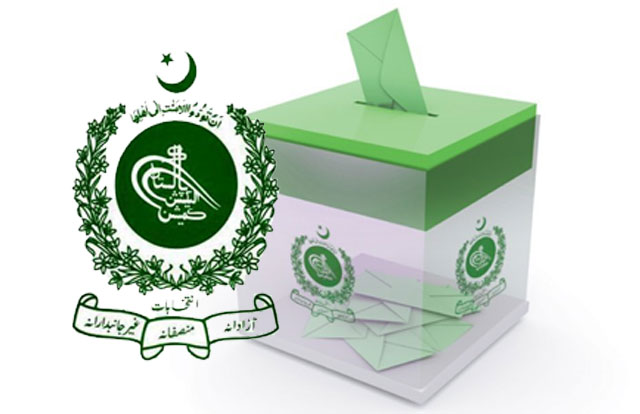The Election Commission of Pakistan (ECP) on Thursday released codes of conduct for “foreign observers”, polling staff and security officials who will be deployed during the upcoming general elections scheduled for July 25.
The code of conduct for international observers, who would be arriving in Pakistan during the elections to oversee the polling process, comprises 14 points. While representatives of any national or international organisation have the right to observe the election process under Section 238 of the Elections Act 2017, the ECP guideline requires the observers to obtain and “prominently display” a permit from the election body.
The code of conduct further orders:
- Observers to identify themselves when asked to by officials
- To respect Pakistan’s integrity as well as basic rights and freedom of the public
- To remain respectful towards people as well as the country’s tradition and culture and uphold professional standards
- To follow Pakistan’s laws and respect the ECP and its staff’s authority
- To follow guidelines issued by the ECP and government institutions including security officials and treat them with respect
- To remain politically impartial and not show bias for or against representatives of national institutions or political parties
- Not to indulge or participate in any activity that would give a positive or negative impression of any political party or its candidates
- Ask any question regarding the elections without interrupting the polling process intentionally or unintentionally
- To ensure that their observations are unbiased, objective and factually correct
- Not to give their personal opinion about their inspection of the election process on any media outlet
- Observatory institutions and groups must ensure that only their nominated officials give their opinion on the election process
- Observatory groups can share their inspection process, findings and recommendations with the ECP
- All organisations that have requested a permit for their inspectors are to ensure that they communicate the electoral rules and regulations, as well as the code of conduct issued by the ECP, to their representatives
Code of conduct for polling staff
The ECP also issued a 13-point code of conduct for its polling staff that requires them to be punctual and perform their duties without any bias for or against any political party, electoral candidates, media outlets, inspectors or political parties’ representatives.
The rest of the guidelines are:
- Presiding officers must only obey orders issued by the district returning officers or returning officers
- Assisting presiding officers and polling staff must obey orders issued by the presiding officer while on duty
- Polling staff must perform their duties in accordance with the law and remain in contact with their superiors at all times
- If any official cannot perform their duties for any reason, they must inform their presiding officer without delay, who in turn will inform their returning officer
- Polling staff will not get involved in any political activity or campaign, nor will they show their personal preference or bias while performing their duties
- Polling staff will not wear the electoral sign of any candidate nor will they wear a badge of any political party
- Polling staff will ensure the secrecy of the votes cast by voters
- The presiding officer will ensure that the voting process is carried out smoothly
- Polling staff will be courteous towards all voters and the assistants of differently-abled people
- Polling staff will ensure that proper guidance and help is provided to elderly, transgender, pregnant women and differently-abled voters
- Polling staff, especially assistant presiding officers, will assist their presiding officers until the completion of election results and during the packing of voting equipment
Code of conduct for security officials
The ECP issued a separate code of conduct for the security officials deployed to ensure the election is carried out peacefully. The 11-point code of conduct binds them to perform their duty in accordance with the law and cooperate with the presiding officers, returning officers and polling staff.
The code orders the security officials to:
- Remain impartial during the voting process and will not work for or against any political party or electoral candidate
- Will be bound to obey all legal orders issued by the presiding and returning officers
- Will remain outside the premises of the polling station (where they have been deployed) or remain at a place where they have been ordered to perform their duties in by the presiding officer
- Will not enter the premises of the polling station unless ordered by the presiding officer
- Will assist the presiding officer in maintaining or establishing peace at the polling station
- Will assist voters outside the polling station and ensure that they stand in line
- Will assist elderly, transgender, pregnant women and differently-abled voters as much as possible and will allow them to stand in front of the line
- Will ensure that the atmosphere outside the polling station is friendly and safe and voters can exercise their right to vote without any fear and confrontation
- Will remain careful in the transportation of voting equipment and ensure that all equipment and polling staff have arrived safely at the polling station; will ensure that the quipment has been returned to presiding officers after voting ends
- Will ensure that voting process concludes peacefully
Last week, President Mamnoon Hussain approved a summary sent by the ECP recommending that the general elections be held on July 25. The polling for the national and provincial assemblies will be held on the same day.
The five-year constitutional term of the National Assembly and the Punjab Assembly will end tonight.
According to clause 224 of the Constitution, elections for the national and provincial assemblies are to be held within 60 days following the day the term of the assemblies expires.







